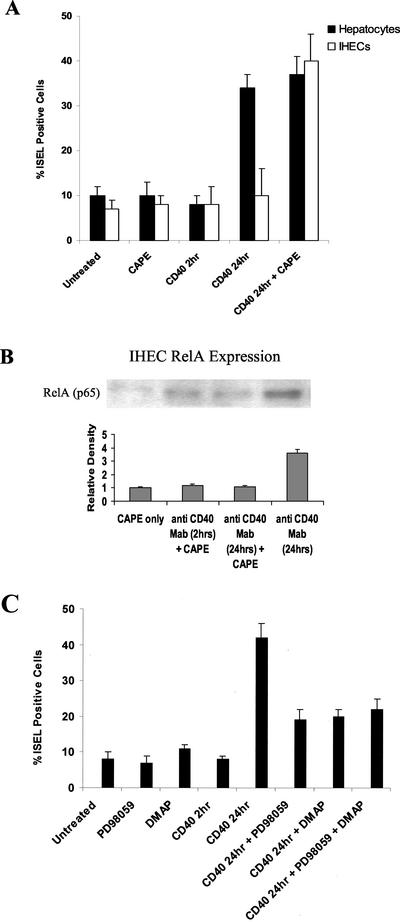Figure 10.
Effects of specific NF-κB, ERK, and/or JNK inhibitors on levels of apoptosis in hepatocytes or IHECs after CD40 stimulation. (A) Histogram shows the percentage of ISEL-positive apoptotic cells in either unstimulated or CD40-stimulated primary human hepatocytes or IHECs in the presence or absence of the NF-κB inhibitor, CAPE (25 μg/ml). The addition of CAPE to IHECs allowed CD40 to trigger similar levels of apoptosis to those induced in the hepatocytes. The results summarize data from at least four separate experiments. (B) Western immunoblot showing inhibition of nuclear RelA levels by a specific NF-κB inhibitor in CD40-stimulated IHECs. Aliquots of nuclear extracts (40 μg of protein) from cultured and stimulated primary human IHECs were subjected to Western blot analysis. Relative changes in RelA levels as determined by densitometric analysis, and various experimental conditions are shown in the histograms (n = 3). Use of the selective inhibitor to NF-κB, CAPE (25 μg/ml), in CD40-stimulated IHECs prevented increase in nuclear RelA (p65) levels. (C) Histogram shows the percentage of CD40-stimulated and unstimulated primary human hepatocytes positive by ISEL staining in the presence or absence of the selective ERK and/or JNK inhibitors PD98059 (50 μM) and DMAP (100 μM), respectively. The inhibitors reduced hepatocyte apoptosis in response to CD40 activation, however, levels of apoptosis were still above baseline. The results summarize data from at least four separate experiments.

